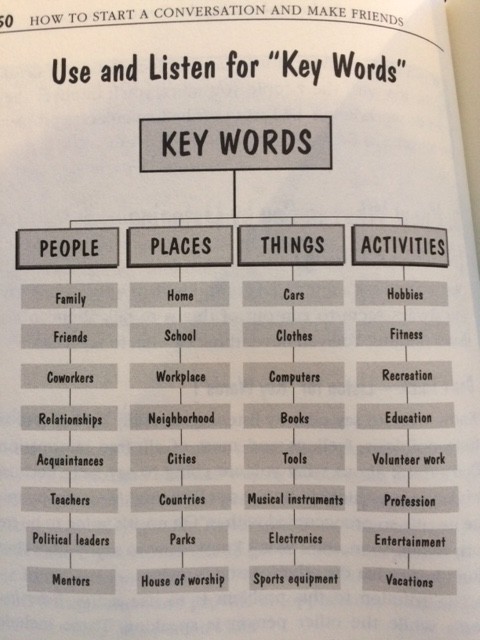Love without conversation is impossible. –Mortimer Adler
After reading this, would you be willing to share this and offer a comment below? I respond to each comment.
I remember meeting the philosopher, Mortimer Adler when I was a middle school kid in Aspen, CO. And the one thing I remember about him, besides he is really smart, is that he talked to me, even though I was probably the youngest person in the room. In all my years of student ministry, I believe if you can learn just 3 skills you will impact more students than you can possibly dream of. If you want to have a dynamic student ministry then simply help your leadership team excel in these areas and then the rest is gravy. I’ve attached at the end of this post a 1 page resource you can download that will help you keep meeting new students and following up with them well.
1 – BEING THERE
You may be able to recruit people to serve in your student ministry. You may even be able to get them to commit to training. But to get them to commit to going to a middle school, high school, or college campus 1-2 times a week to meet students and build relationships is what separates the prairie dogs from the pandas. Prairie dogs are a dime a dozen, but there are only few pandas. They are giant, lovable furballs that everybody loves. If you can multiply panda-like student ministry leaders who are willing to do the hard stuff and go onto the turf of students to build relationships, then you are already a cut above the rest.
I’ve lost count of excuses that leaders have for why they can’t make it onto campus or other places where students hang out. The bottom line is that this is the hardest part of student ministry which is why most student ministries don’t do it. If your leaders make excuses, if they don’t go meet students, if they don’t text or call students to follow up with them, it is because they are scared, so you need to help them overcome their fear. It’s a like working out… the first few weeks are hard, but if you can maintain a routine, then it gets easier and more enjoyable. But it is easy to give up if you don’t know how to strike up good conversations with students every time you go meet them on their turf.
2 – TALKING WITH STUDENTS
Most students are a bit passive when it comes to conversation with new people. Everybody is waiting for someone else to start the conversation. Jesus knew this so, for example, he started the conversation with a sinful women at the well. Jesus had so many winsome qualities. One that really stands out is the way he initiated conversation with people to show them love:
A woman, a Samaritan, came to draw water. Jesus said, ‘Would you give me a drink of water?’ – John 4:7-8
If you go meet students with the understanding that you are the initiator, then you’ll have much more fun, and people will open up to you. Here are some really simple tips for starting conversations and keeping them going:
Closed-ended Questions Break the Ice:
Here are 5 words to use that are easy conversation openers (I’ve listed a couple easy examples for middle school, high school, and college students just to get creativity flowing… I think talking with college students is much easier because of their maturity so just be creative):
- Are?
- Middle School: What grade are you in? | What are you looking forward to this weekend?
- High School: What are your favorite classes this semester? Least favorite? | Are there any classes you need help in?
- College: How are you getting along with your roommates?
- Do?
- Middle School: Do you play any sports or other after school activities? | Do you have any brothers and sisters? How do you get a long?
- High School: What do you like to do when you have free time? What kinds of things does your family like to do?
- What kind of goals do you have for this year?
- Where?
- Middle School: Where do you and your friends like to hang out on the weekends? Where do you like to hang out after school?
- High School: Where’s a place you’d love to go some day? Where would you like to go to college when you graduate?
- College: Where are you going for Spring Break?
- Which?
- Middle School: Which subject in school is easiest for you? Which is one of the hardest?
- High School: Which sport in your school gets the most fans out to the games? If you had a choice, which pizza place in town is the best pizza? How about which donut? Which coffee place?
- College: Which class of yours challenges you the most? Which professor do you respect the most and why?
- Who?
- Middle School: Who are some of your friends in school that you hang out with? Who do you think is going to win the (name a professional sports game) this weekend?
- High School: Who are some of the teachers in your school that make you laugh the most? Who do you feel like you can freely talk with and they will accept you no matter what?
- College: Who are some of your closest friends this year? How would you describe them?
Open-ended Questions:
These kinds of questions are usually better for conversation because they have alot more latitude where the conversation can go. They usually can’t be answered with a “yes” or “no”… so they help the person you are talking with open up a bit more. Commonly these types of questions use these key words:
- How?
- How did you get involved in….
- How did you get so good at…
- How are you liking…
- If?
- What if (your local team) has another losing season this year? Do you think the coach will still be around next year?
- If you could make a wish list of 3 things you want to see changed, what would be on the list?
- If you could do over something in your life what would it be?
- Why?
- Why do you think people cut each other down?
- Why do you think getting the most out of your education is important?
- Why do you think competition in sports is a good thing?
- Why do you think music and art make the world a better place?
- Would?
- What is something that would greatly improve your school experience?
- Would you ever consider…?
- What?
- What do you think about…?
- What’s your opinion about…?
- What is something that you are really good at?
- What really makes your day great?
- In what ways?
- In what ways do you try to be a good friend to your friends?
- In what ways does your family like to celebrate (the upcoming holiday)?
Look for cues to help you start a conversation:
If you are listening well, people will give you information in the key words that they use. If you hear a student mention something interesting or novel about them, then ask them a follow up question to learn more about that aspect of their life. Here is a tool from the book, How to Start a Conversation and Make Friends, by Don Gabor that provides some great “key words” to either listen for or use to initiate a good conversation starter. Conversation usually revolves around people, places, things, and activities:
RELATED: 165 Conversation Starter Questions for Outdoor Ministry
3 – REMEMBERING NAMES
Everyone likes to hear their name, and it is really impactful if someone who just met you remembers your name. This is a tough skill because it really requires you to remove distractions and focus solely on the person you are meeting. There are lots of trips and tricks for this, but the two best ways I’ve learned are:
- Association: When the person tells me their name, I immediately think of some else I know that remotely looks like them or reminds me of them and has the same name. Then I associate the new person I’m meeting with someone else I know who has the same name.
- Say their name: If you can repeat their name 2-3 times in the process of the initial conversation and then do that in the next couple of times you talk with the person then you will probably remember their name.
RELATED: 3 Things Teenagers Need to Hear from Adults
JUST TAKE ONE STEP:
- Download this 1 page resource I use to help me keep building relationships with students and following up well:
20 : 12 : 2 Vision – This week: Pray, Call/Text, Do Something With, & Apprentice Students
- Commit to intentionally going to a campus or where students hang out once a week to build some new relationships. Make it a habit in your student ministry team meetings to go over the next week’s opportunities at the school (games, lunches, performances, etc.) and have everyone commit to going with another leader to the school for 30 minutes to an hour.
- Try to memorize some of the simple suggestions in the “Talk to Students” section above and try one of them this week with students.
- Create a student prayer list with all of the names of students you know. Remember their names by praying for them each week. And when you meet a new student, try to use the “Association” and the “Say their name” strategy to remember at least one new name this week.



Hey Ashley, good stuff! This translates to campus ministry too…
Thanks Kyle, I totally agree!
I also added a few examples for college students…